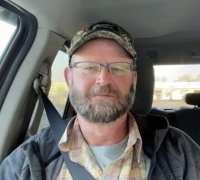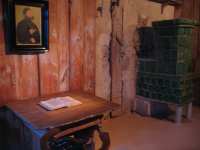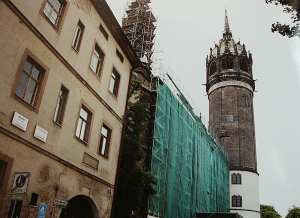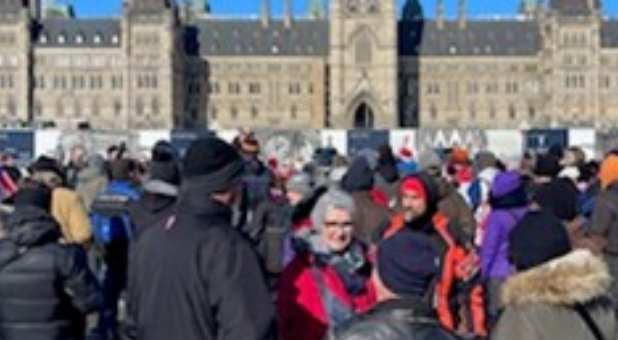The Glorious Moment: Canadian Truckers Sing Martin Luther’s Most Famous Hymn
Editor’s Note: Click the links to read two more articles by Pastor Jim Garlow on the Canadian truckers, “When God Couldn’t Find Enough Bold Pastors, He Called the Truckers,” Part 1 and Part 2.
I have been making calls to persons on the front line of the Canadian truckers’ event. Given that it is a cry for freedom, the movement was birthed from the heart of God. So long as the truckers can keep out persons from the outside with nefarious plans, this is a spiritual event.
One of those I called was Harold Jonker, co-owner of Jonker Trucking Company of Canada, who drove the first truck in the first convoy into Ottawa, Ontario, Canada.

Harold Jonker (courtesy)
Jonker took my call, but he did not say a word because the group was busy praising the Lord. Without a single comment, he merely held the phone so I could hear what was happening.
The truckers were standing before the Parliament Building, singing “A Mighty Fortress Is Our God.” I had to choke back tears as I listened.
Imagine with me, if you would, a group of truckers singing these words, knowing that their political leader had just taken action that could freeze all their bank funds, making it impossible for them to make a single purchase. He could possibly bring in military forces, or he might arrest them. More likely, he might order troops to begin “kettling” them, as they call it, a method by which law enforcement and/or military press people in, making the crowds more and more compact while cutting off all routes of escape.
Under these uncertainties, I could hear these brave warriors singing, verse after verse, the powerful song, “A Mighty Fortress is Our God”:
1—A mighty fortress is our God, a bulwark never failing/ Our helper He, amid the flood of mortal ills prevailing:
For still our ancient foe doth seek to work us woe/ His craft and pow’r are great, and, armed with cruel hate/ On earth is not his equal.
2—Did we in our own strength confide, our striving would be losing/ Were not the right Man on our side, the Man of God’s own choosing:
Dost ask who that may be? Christ Jesus, it is He/ Lord Sabaoth, His Name, from age to age the same/ And He must win the battle.
3—And though this world, with devils filled, should threaten to undo us/ We will not fear, for God hath willed His truth to triumph through us;
The Prince of Darkness grim, we tremble not for him/ His rage we can endure, for lo, his doom is sure/ One little word shall fell him.
4 —That word above all earthly pow’rs, no thanks to them, abideth/ The Spirit and the gifts are ours through Him Who with us sideth;
Let goods and kindred go, this mortal life also/ The body they may kill: God’s truth abideth still/ His kingdom is forever.
I cannot describe what it was like hearing these saints of God, within harm’s way (thanks to Trudeau), singing confidently:
— “For still our ancient foe/doth seek to work us woe.”
— “Were not the right Man on our side,” followed by “Dost ask who that may be? Christ Jesus, it is He.”
— “We tremble not for him (“the Prince of Darkness”), followed by “His rage we can endure.”
— “The body they may kill/ God’s truth abideth still.”
It was sobering.
I noticed on the Jonker Trucking Company website that Harold’s father, who started their family trucking business, was named George Jonker.
My graduate degrees are in church history. I have taken people on European Church History tours, including the sites of Martin Luther. When Martin Luther was being hidden from the authorities who were trying to kill him for standing for truth, after his famous “I will not recant. Here I stand. I can do no other” speech at the Diet (a dispute or debating assembly) of Worms (the name of a city, pronounced “Vorms”) in 1521, his friends kidnapped him—without his consent—to protect him from the plan by authorities to kill him further down the road.
Luther’s friends forcibly took him to the castle in Wartburg where he, in confinement, translated the Bible from Erasmus’ Greek text into the common language of the German people (Low German), giving them, for the first time, a Bible they could understand.

The room where Luther was held at Wartburg Castle (Wikimedia Commons)
It was there that Luther had his well-known encounter with Satan while held at the Wartburg Castle, which provoked him to throw an inkwell at the devil, leaving a mark on the wall. The often-quoted phrase that he had “driven the devil away with ink” referred both to this event and Luther’s voluminous writing. And the famous ink splotch became one of the symbols of the Lutheran Reformation and its victory over the evil one.
Here is the purpose for this extended story: While his friends held and protected Martin Luther, he grew a long beard to make him less recognizable, as he was allowed to move about some. He also received an alias. His new name was “Junker Jorg” (“George” in English). “Junker” is “knight” in English.
The founder of the truck company was “George Jonker” —Harold’s truck-driving father. Reverse surname and first name—a practice common in parts of Europe, Asia and Africa—and one has “Junker George,” the alias for the Martin Luther who wrote the grand hymn Harold Jonker and the other truck drivers were singing.

Wittenberg Castle Church with tower inscription (Wikimedia Commons)
There is more to the unusual Canadian truckers/Martin Luther connection. The song “A Mighty Fortress is Our God,” which Mr. Jonker and his truck-driving friends were singing when I phoned him, is based on Psalm 46. Martin Luther nailed his 95 Theses on the door of the church—a common practice at that location, as it was a type of bulletin board—in Wittenberg, Germany, on Oct. 31, 1517. This touched off the massive Protestant (from the word “protest”) Reformation.
The door was at the base of a large Gothic tower with a rounded dome and spires pointing toward heaven, on which the words are engraved at the top, “Ein Feste Burg ist Unser Gott, Ein Gute Wehr und Waffen.” Those are the opening words of the famous Martin Luther hymn, “A mighty fortress is our God/ a bulwark never failing.”
The Canadian truckers had some things in common with Martin Luther. Both were facing an uncertain future and a fierce foe. And both chose to sing about it.
When the Canadian truckers finished singing that great hymn, written in approximately 1528, they continued with “Amazing Grace.” I could hear them singing, “through many dangers toils and snares/ I have already come.”
And from that, they proceeded directly into “The Doxology,” which begins with the words, “Praise God, from whom all blessings flow.”
Their emperor-czar had just suspended the law of the land and arbitrarily revoked their constitutional rights, yet they were praising God!
At last, Harold Jonker and I talked. In all that is happening in Canada, with all its uncertainty caused by Trudeau’s ominous fiats, they are at peace, even joyous.
In typical Canadian serenity, he calmly explained, “We are going about our day.”
For years, you have read about the heroes of history. You now have a chance to not merely read history but actually observe it in the making.
But you can be more than an observer. You can actually make history! How? By praying for the truckers and their continuing hunger for a biblically grounded freedom and for their safety, and that outside agitators, saboteurs or government plants do not bring violence into what is a peaceful truckers’ blockade.
Someday you will say to your grandchildren, “Let me tell you the story about the time when God miraculously raised up a group of Canadian truckers to save the world from despotism and tyranny.”
Click here to watch a prayer call interview Dr. Garlow recorded with Harold Junker prior to the moment at the Canadian Parliament. {eoa}
Dr Jim Garlow is the founder and CEO of Well Versed, which brings biblical principles of governance to government leaders in Washington, D.C.; at the United Nations in New York City; and in capital cities of several nations. Find him at WellVersedWorld.org.














































